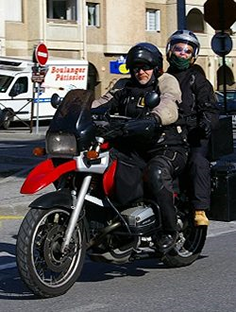 Back in 2011 motorcyclist Jon Strong submitted a series of complaints to the European Ombudsman.
Back in 2011 motorcyclist Jon Strong submitted a series of complaints to the European Ombudsman.
These complaints consisted of allegations that the European Commission failed properly to reply to his correspondence.
The on-going and at times, arrogant correspondence to the Commission, contested the quality of a survey that it had conducted (it was only available in English) before the Commission made a legislative proposal about Road Worthiness Testing) in the area of road safety. He also requested access to a number of Commission documents in support of that proposal.
When the Commission failed to reply to Mr Strong’s lengthy criticisms and failed to provide him with the requested documents, the Commission representative (Isabelle Kardacz) stated that she would stop all exchange of correspondence. Mr Strong then turned to the Ombudsman to complain.
In this particular case, the Commission had evoked the Code of Good Administrative Behaviour, which allows stopping correspondence if this can reasonably be regarded as improper, for example, because it is repetitive, abusive and/or pointless.
The Commission’s Directorate-General for Mobility and Transport (DG MOVE) decided to discontinue correspondence with the complainant (wrongly, it later transpired).
List of Allegations and Complaints
The list of allegations and complaints were as follows:
DG MOVE (Commission) failed properly to deal with the complainant’s request for access to documents relating to:
(a) the “Periodic Technical Inspections” (the ‘PTI survey’); Mr Strong argued that the Commission failed properly to draft the PTI survey questionnaire. In his view, DG MOVE failed properly to conduct research to draft legislation which had an important impact on citizens. He also considered that conducting a survey in English only did not respect the right of every person to be heard.
(b) the impact assessment on “Type Approval” conducted by the Directorate-General for Enterprise and Industry; Strong alleged the impact assessment contained distorted findings, which resulted in a legislative measure which is disproportionate when compared with the causes of accidents it would, allegedly, avoid.
(c) the budget allocated by the Commission to “Road Safety”; Mr Strong argued that DG MOVE failed to demonstrate that it was spending funds wisely and that it was directing them to areas where they would have a maximum effect. The absence of a strategic plan, showing the relationship between the investment in the motorcycle safety programmes and the expected outcomes in terms of projected lives saved, represented, in his view, a complete and utter failure to comply with the principle of sound financial management………..
(d) the “SAFERIDER” programme. The “SAFERIDER” projects aim & objectives were to study the potential of advanced rider assistance systems and on-bike information systems, in short electronic systems for navigation & route guidance – navigation & route guidance – speed alert – curve warnings – frontal collision warning – improve safety on intersections – lane change support etc. Riders were represented actively in the project by the Federation of European Motorcyclists Associations (FEMA). Mr Strong noted that the SAFERIDER project aimed at studying devices with the potential of making PTW riding safer. According to Mr Strong, DG MOVE expected some warning devices to be fitted onto new motorcycles within two years. Press releases reported that the Commission had stated that such systems would be introduced through legislation as a last resort if manufacturers did not adopt them voluntarily. The complainant thus concluded that the SAFERIDER project team was under considerable political pressure to deliver technology regardless of its ability to save lives.
Omdudsman Replies
Periodic Technical Inspections “the ‘PTI survey’ – The Ombudsman found that the Commission was wrong to have conducted the survey in question in English only. This situation resulted in the overall number of replies being necessarily limited. The Ombudsman encouraged the Commission to acknowledge in the present case that it would have been better not to have confined the survey to the English language and to consider whether there are any lessons to be drawn for the future.
We have reported extensively on the Road Worthiness Test proposal since 2010 including the numerous European demos by motorcyclists – debates – public hearings – in committee and Parliament – including the recent European Plenary session vote at the Parliament in Strasbourg which voted on (for now) the inclusion of motorcycles – Click HereThe impact assessment on “Type Approval” – The Commission assured the Ombudsman that it had followed a strict and rigorous procedure to guarantee the quality of the impact assessment. A separate Impact Assessment Board, consisting of senior high-level Commission staff, reviewed the final report, in accordance with the applicable procedure. Then, an Impact Assessment Steering Group of the Commission provided additional guidance. The resulting detailed analysis on preferred policy options was then used as basis for the Commission to draft its Proposal for an Approval and Market Regulation. The Commission emphasised that, while conducting the public consultation, carrying out the impact assessment and drafting the actual proposal, it was also regularly discussing the issues and possible policy measures in the Motorcycle Working Group. Indeed, it did so for more than seven years
The Ombudsman commented, “”The Commission’s opinion provides a complete and easily understood account of the steps it has undertaken before submitting its proposals to EP (European Parliament and Council scrutiny.
The Ombudsman also noted that Mr Strong has strong views on the legislative proposals as such (Type Approval & Road Worthiness Testing) and he considers that the policy options underlying the Commission’s are inconsistent with the available data relating to the causes of accidents involving PTWs which in his opinion the proposals are ineffective for minimising those causes, and adopting any such legislation would amount to preferring the interests of the industry over the interests of the road users, in particular PTWs, at large. The Ombudsman noted that this is an opinion shared by a significant number of motorcyclists who have contacted the Ombudsman and expressed their strong support for the complaint.
However the Ombudsman concluded that, “It will not inquire into the substantive merits of legislation or of legislative proposals that are before the European Parliament. He invites the complainant to consider submitting a petition on this matter to the European Parliament.”
In December 2012 the representatives of the EU member states, adopted the regulation laying down new safety and environmental requirements for the type-approval of motorcycles and other L-category motor vehicles – the so-called “anti-tampering” regulation. So any “fight” against this legislation would be retrospective and against the combined weight of the democratic process of the European Union.
We reported extensively on the regulation proposal – Click Here
The budget allocated by the Commission to “Road Safety” – With regards to Road Safety, the Commission explained that the budget allocated to it at the time of its opinion was about EUR one million per year. This budget is used in line with the objectives identified in the Policy Orientations on Road Safety.
The Ombudsman said, “While the Ombudsman acknowledges that the complainant is correct to point, essentially, to the need for the use of funds from the EU budget to be as effective and efficient as possible, it emerges clearly from the complainant’s submissions that what he contests is the Commission’s policy choices…….” “The Ombudsman’s role is not to substitute his judgment for that of the Commission. The Ombudsman’s inquiries into this aspect of the case have revealed neither a procedural error, nor a manifest error of appraisal. The Ombudsman underlines once again, however, that the complainant could contest the Commission’s policies through a petition to the European Parliament.”
SAFE RIDER – The Commission clarified that the results of these kinds of studies do not necessarily lead to legal requirements to equip motorcycles with any of the products that have been investigated. Any legal requirement will have to follow the applicable procedures, as explained previously in respect of the procedures applicable to Commission’s legislative proposals.
The Ombudsman concluded, “In sum, the complainant doubts the effectiveness of warning devices, such as vibrating saddles, handlebar grips, cheek pads and head up displays, to be fitted onto motorcycles and helmets, as that project advises. ……, “The Ombudsman’s role is not to substitute his judgment for that of the Commission. The Ombudsman’s inquiries into this aspect of the case have revealed neither a procedural error, nor a manifest error of appraisal. The Ombudsman underlines once again, however, that the complainant could contest the Commission’s policies through a petition to the European Parliament.”
The SAFERIDER project finished in 2010, we reported extensively on the SAFERIDER project – Click Here
To Summarize
Apart from the Ombudsman inviting Mr Strong to take his issues to the European Parliament through petitions what really has been achieved?
Mr Strong has already Petitioned Parliament. In 2012, supported by the Motorcycle Action Group (MAG UK) contacting “every MEP”, Mr Strong petitioned the Committee on Petitions requesting a postponement of IMCO (Internal Market and Consumer Protection) and EU Parliament Plenary votes on the Regulation for Powered Two Wheeler Type Approval and Market Surveillance (Type Approval Regulation for motorcycles) until the EU Ombudsman has published his decision on the complaint covering the proposed regulation.
Mr Strong pointed out he was waiting to hear from the Ombudsman to decide on maladministration by EU institutions, whether there has been maladministration in the process by which the draft legislative act covering Type Approval and proposed by the European Commission was drafted and consequently as to the legality of that act.
Although Mr Strong pointed out the urgency of his requests, the vote in the IMCO and EU Parliament has already taken place, so in essence, nothing had been achieved!
What the Ombudsman concludes in his decision was that, “It also became apparent that what the complainant ultimately sought was a change in legislation affecting him as a motorcyclist.”
Finally, the Ombudsman noted that during the inquiry, the Commission had assured him that it was prepared to submit the complainant’s views to its expert groups working on the relevant legislative proposals. The Ombudsman therefore invited the Commission to confirm to him that it had indeed followed up those assurances and had forwarded the complainant’s views on those proposals to its expert groups.
With the actions listed above, the Ombudsman closed the case with the following conclusion:
No further inquiries are justified.
Our Conclusion
It must be remembered that Mr Strong did not confine his interpretation of these issues solely to the European Commission and the Ombudsman. As mentioned he has already approached the Petition Committee of the European Parliament and also numerous MEPs, Commissioners and rider organisations.
Last year we had short conversations with Mr Strong during the IFZ Conference – FEMA Forum in Germany and while he had no doubt in his own mind of how legislation and other issues would affect him as a motorcyclist, we did not agree with him then (and now) and certainly not in his approach which included reference to his personal life and upbringing.
Although he had been praised in the past by a UK rider’s organisation, at their annual group conference, for his continual determination and analytical skills in his complaint to the European Ombudsman, there is a borderline between sanity and rational discourse and rhetorical diatribe.
In our view, having read the river of correspondence with references to his grandmother, his riding skills, Magna Carta 1297, the American war of Independence, the Boer War, the Second World War, his motorcycle collisions and a Jewish solicitor who defended victims of Nazism (when writing to the German President of the European Parliament), we can’t help but wonder – where did he come from?
More to the point, why would the motorcycling community even consider this person as a representative of our rights?
So maybe it is a case of Strong – Enough!
Decision of the European Ombudsman
Summary of the decision on complaint 875/2011/JF against the European Commission – Click Here
The Commission’s handling of the complainant’s correspondence about safety policies for ‘Powered Two-Wheelers’ (‘PTW’) – Click Here
Decision of the European Ombudsman closing his inquiry into complaint 875/2011/JF against the European Commission – Click Here
Comment on Right To Ride EU – Click Here


